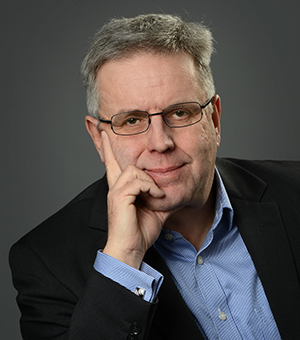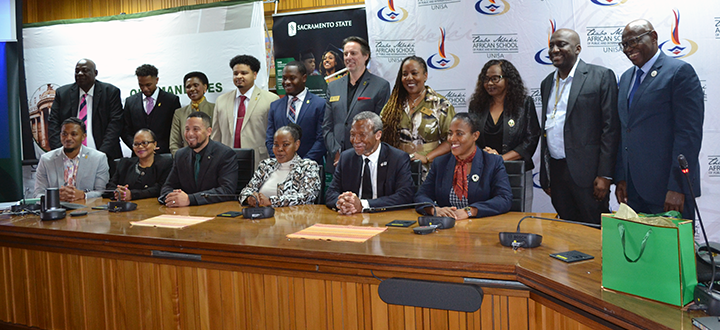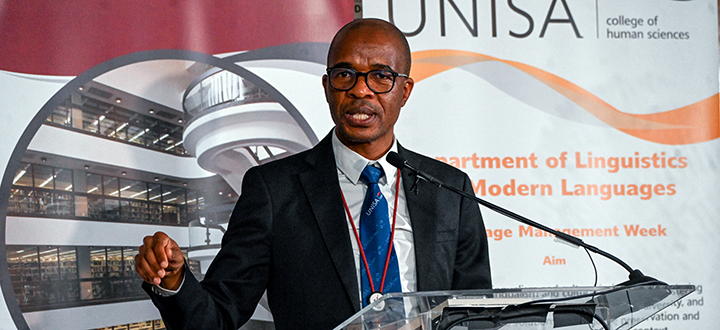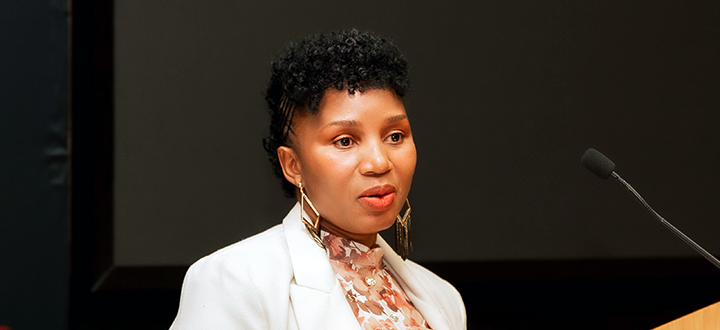College of Human Sciences
Celebrating successes of Unisa-GBFE partnership

Prof Volker Kessler, Professor Extraordinarius in Unisa’s Department of Philosophy, Practical and Systematic Theology, and Dean of the Gesellschaft für Bildung und Forschung in Europa (GBFE) (Association for Education and Research in Europe).
Professor Extraordinarius in Unisa’s Department of Philosophy, Practical and Systematic Theology, and Dean of the Gesellschaft für Bildung und Forschung in Europa (GBFE) (Association for Education and Research in Europe), Prof Volker Kessler, has shared some exciting news with the Unisa community. He was recently informed that his paper, Spirituality in mathematics, published in the accredited Journal for the Study of Spirituality, was the most downloaded article in the past 12 months, with 365 downloads.
The university and the GBFE have been in an academic partnership since 2000, an exciting venture for Unisa. The cooperation between the GBFE, an international and intercultural network of Christian educational institutions, and Unisa, began within the university’s theology cluster, housed in the College of Human Sciences (CHS). The GBFE is a non-governmental organisation that promotes international studies and research projects in the fields of culture, religion, theology and community, and recruits European postgraduate students to study at Unisa. Its task and purpose is to enable GBFE students to receive a well-founded academic postgraduate education.
Due to the success of the partnership, there has been a growth in interest and the partnership has expanded to other disciplines within the CHS such as Development Studies and Psychology. An academic board is responsible for all issues related to academics in the GBFE-Unisa network. These include the development of new courses, quality control, acceptance criteria for students and contact to the people in charge of the respective disciplines at Unisa. Many GBFE professors are also research fellows and professors extraordinaire within the CHS and they contribute to the university’s research output by conducting joint research and publishing with Unisa scholars.
South influencing North
Additionally, Kessler explains that the GBFE is a network of 13 colleges in Europe, with the majority being in Germany and Switzerland, but there are also colleges from Denmark, Norway and Russia. He says a partnership of this kind is important because "we live in a global world, and we can learn from each other". He said the partnership allows for knowledge to be transferred from the South to the North. "Often the North influences the South. For example, German car manufacturers like BMW and Volkswagen have factories in South Africa. In these cases, the blueprint comes from Germany and the cars are produced in South Africa. In our cooperation, it is the opposite direction - the blueprint for the studies comes from South Africa and the production takes place in Europe."
Discussing the positive outcomes of this partnership, he said: "It is a win-win-situation. As academic associates, the GBFE professors contribute to the research output of Unisa. On the other hand, 300 master’s and doctoral students from GBFE have received a degree from a worldwide recognised university such as Unisa. We also have had a series of joint conferences and joint publications. Coming together from Europe and South Africa with different perspectives and questions stimulates our research."
Addressing the impact that the Covid-19 pandemic might have on the partnership, Kessler said: "The good thing is that Unisa is a distance university. This is a huge advantage in these days." However, as this year would have been the 20th anniversary of the partnership between Unisa and GBFE, there is slight disappointment that this cannot be celebrated as expected. "It has been postponed to next year when we hope to celebrate 21 years."
Four gateways to spirituality
Speaking on his article, Spirituality in mathematics, Kessler believes that it received 365 downloads because its title "makes people curious". "For many people the two disciplines - spirituality and mathematics - are far away from each other, so they might wonder how one can bring them together. In my article, I analyse spiritual experiences that some mathematicians have while doing mathematics. I got this information from autobiographical notes of mathematicians and discovered four gateways by which spirituality can enter mathematics. Often in school education, mathematics is presented as something useful, and therefore I would encourage math teachers to also teach something about the spirituality in mathematics. It might provide extra motivation for some students."
You can read Spirituality in mathematics here.
* By Rivonia Naidu-Hoffmeester, Communications and Marketing Specialist, College of Human Sciences
Publish date: 2020-06-19 00:00:00.0


 Unisa and Egypt join hands to illuminate a shared past
Unisa and Egypt join hands to illuminate a shared past
 Turning waste into power – The Archaea Eco story
Turning waste into power – The Archaea Eco story
 Advancing academic excellence through global collaboration
Advancing academic excellence through global collaboration
 Unisa celebrates African wisdom with groundbreaking multilingual proverbs book
Unisa celebrates African wisdom with groundbreaking multilingual proverbs book
 Wings of opportunity: Bringing drones into the classroom
Wings of opportunity: Bringing drones into the classroom